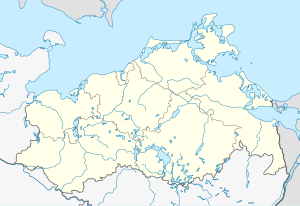Zülow hydropower plant
| Zülow hydropower plant | ||
|---|---|---|
| Main building of the listed hydropower plant | ||
| location | ||
|
|
||
| Coordinates | 53 ° 42 ′ 14 " N , 11 ° 54 ′ 20" E | |
| country | Germany | |
| place | Sternberg | |
| Waters | Mildenitz Canal | |
| power plant | ||
| Start of operation | 1924 | |
| Listed since | 1983 | |
| technology | ||
| Bottleneck performance | 1.1 megawatts | |
| Average height of fall |
22 m | |
| Turbines | 2 Francis turbines | |
| Others | ||
The Zülow hydropower plant is the largest hydropower plant in Mecklenburg-Western Pomerania . It was built between 1922 and 1924. Considered since 1973, it became a technical monument in 1982 . It is located in Zülow, a district east of Sternberg on the Mildenitz Canal in the middle of a terminal moraine .
history
The hydropower plants in Mecklenburg today partly work with modern technology, but their substance is much older.
The Mildenitz , which comes from Goldberg and flows into the Warnow via Sternberg , was diverted for the Zülow power plant over a length of 5.8 kilometers in order to utilize the gradient. The power station canal branches off the natural course of the Mildenitz near the village of Rothen , which continues to receive some open water. It crosses a 250-meter-long tunnel, widens into a small lake and flows into a second reservoir in Zülow, before the water at up to 7.24 cubic meters per second through a concrete pipe with a 1.80 meter diameter down the slope to the power plant turbines presses. The underwater canal, which is 22 meters lower, leads through a 30 hectare swamp area. The Zülower See, which was drained for the construction of the power plant, was once located here. The tunnel in the upper water channel was part of a compensation so that the fields of the owners Oertzen (noble family) remained connected. At that time, by resolution of the state parliament, like Ms. von Dallwitz , he was expropriated for power plant construction. Plans for generating electricity in this area had already been submitted in 1908. But only after the First World War could 1922 begin. The construction company in charge was Philipp Holzmann AG , because the Feldbahn locomotive caused a fire on May 1, 1924 at the Rothener Gutshöft. The power plant was completed by Mecklenburg-Schwerinschen Landes-Elektrizitätswerke (LEW), which was founded by the state in 1920 and was connected to the grid in 1924.
The system with the canal, the concrete bridges over it, the gauge house, the inlet structure, the residential building and the power station building have largely been preserved from the original period. The switchgear and computer system from 1954 are no longer in operation, but have been preserved as a museum. The two turbine sets are from 1954. The generators were renewed in 2005. The old turbo sets from 1924 were dismantled by the Soviet Union in 1945 after the Second World War . In order to get to the big machines, soldiers of the Red Army broke through the outer wall of the machine hall with a tank. There is now a large gate at the location of the hole. The two Francis turbines drive two generators of 550 kilowatts each and use the gradient of 22 meters.
The power plant is now operated as a run-of-river power plant and was owned by WEMAG AG, based in Schwerin , until April 22, 2004 . Since then, the power plant has been privately owned.
Machine room 2005 - new generator SE 630 S16 from AEM Dessau GmbH
See also
literature
- Hans Müller: Monuments in Mecklenburg. Weimar 1976.
- Sven Bardua: Small power plant really big, the Zülow hydropower plant. SVZ, Mecklenburg-Magazin 2000, 9, p. 23.
- Zülow: hydropower plant. In: Technical monuments and sights in West Mecklenburg. 2002, p. 77.
Web links
- Zülow hydropower plant at zwillingsmuehlen.de
- Zülow hydropower plant in the MV culture portal
proof
- ↑ Hans Müller: Technical monuments. In: Monuments in Mecklenburg Weimar 1976 p. 283.
- ↑ Sven Bardua: Small power plant really big , In: MECKLENBURG MAGAZIN, regional supplement of SVZ Schwerin, 2000 No. 9 p. 23
- ↑ verivox.de




